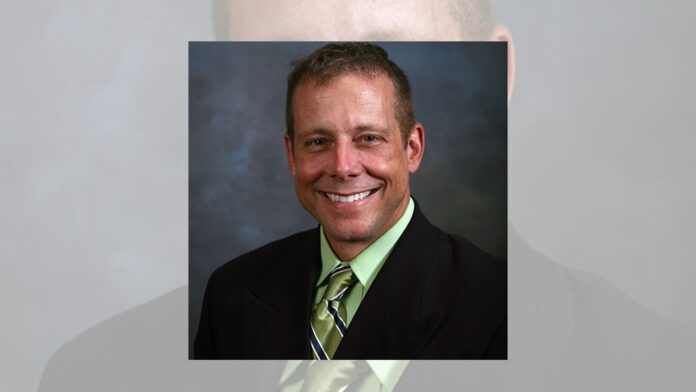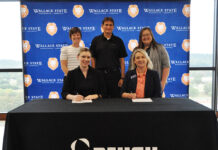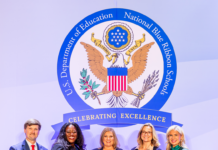CULLMAN, Ala. – Dr. Scott Warner, a pulmonologist who practices at Chest Medicine of Cullman and who has advised community leaders on the COVID-19 pandemic offered a stark warning ahead of Christmas: the local health care system does not have the capacity to handle the predicted rise in cases if people gather in large groups for the holiday.
Warner said the after-Thanksgiving surge is already straining the system.
“We suffered the predicted bump in cases after that. Unfortunately, we’re predicting the same thing to follow Christmas if people are careless,” he said. “Unfortunately, every person’s decision affects dozens of people around them. It’s amazing how many lives we each touch. So, we are unfortunately predicting a bump up, again, at the end of the year following Christmas and into the New Year that we really don’t have the capacity to handle. It’s really urgent for people to reevaluate their Christmas plans on get-togethers and gatherings so that we can put some kind of damper on this and give the vaccine time to work. Again, we’re only hitting the tip of the iceberg right now, giving the vaccine to those people who keep other people alive; that’s basically who’s getting it right now.”
Vaccinations have begun in Cullman, with limited doses of the Pfizer product available. A second vaccine, this one from Moderna, is expected to be available locally soon.
“The vaccination, we’re in the very first phase. We’re following the guidelines of the state health department. We’re hitting the high-risk occupations- health care workers who are directly involved in patient care- and we’re going to move into high-risk occupations outside of the hospital, such as fire, police and other essential workers. From there, we’ll move to high-risk people- people over the age of 75 and people with high-risk illnesses. It’s moving nicely,” said Warner. “There has been some delay getting vaccine at the state level, overall. Again, I can’t speak to why that is. Even the state health officer didn’t get an answer as to why the State was shorted a number of vaccines below what we were initially promised. The good news is the second vaccine has been approved. What we’re doing now is the Pfizer vaccine, which was the first on the market, and the second vaccine is the Moderna vaccine that was approved this week. It is ideally suited for public distribution.”
Warner addressed vaccine hesitancy head-on, saying he could assure people from looking at the data and the papers that there was no shortcut in the science or safety part of the development.
“Some people are a little hesitant because it came out so quickly, well, that’s because the government invested millions and probably billions of dollars in allowing these companies to go ahead and manufacture and stock it, even before it was approved. Because the science was so trustworthy and the need was so great, they went ahead and invested in the process ahead of time, where a company could not have taken that financial risk. If it didn’t get approved, we’d be a year from now before we had a vaccine if it went through the normal process, but the government said, ‘Listen, while you’re doing the studies, go ahead and make it, and go ahead and put it in the warehouses, go ahead and get it ready to go, so that if it is approved, we’ll be able to start the same day or the next day,’ which of course could never have happened in the real world, because if it’s not approved, the company could never have taken that financial risk. This way, if it wasn’t approved, they throw it away; they haven’t lost anything. Now it’s ready to go. So that’s where the ‘shortcuts’ occurred,” he said. “People misunderstand the quickness and maybe think it was sloppy and pushing things through, but that’s not the case at all. With vaccines, if you’re going to see any side effects, those typically occur within the first two months or so, and we followed it for that long. The safety record was good, the effectiveness was good, and the science is good.”
Warner said mRNA vaccine technology, which is used in both the Pfizer and Moderna products, is something that has been studied for quite some time.
“In fact, they almost pulled the trigger for COVID-19’s ‘big brother.’ You know, we had two other major coronavirus near-pandemics that they were going to use mRNA vaccines for, but because public health measures like washing hands and masking kept them from becoming worldwide, we never needed to do that. That started 10 years ago. The first one occurred in China and the second one occurred in Saudi Arabia. This one, the third one, of course occurred in China, but it did get ‘out of the box.’ It’s much more contagious and much more deadly,’ he said. “So, the technology is not new; it just hasn’t been needed for a public vaccine yet. And the methodology, which was so safe and made such good science, the government said we’ll go ahead and buy into this for this one and get six or seven others in the pipeline. Some of those are with the ‘old’ methods, which are slower: killing a virus and then putting it into a vaccine, that takes a lot longer to do to make sure it’s safe.”
He continued, “What we’re doing (with mRNA) is we’re doing a little snippet of the virus’ mRNA, the messenger RNA which makes the protein on the outside of it. It gets into the cell in your arm and creates that protein that’s on the outside of the virus. Within days, that protein is gone, or the mRNA is gone, so it doesn’t get into the nucleus of the cell so it can’t ‘turn you into a virus’ or anything like that. We are a DNA species; this is mRNA. There’s no chance of it causing you a third leg or anything like that. It’s the perfect methodology for this kind of rapid production of a vaccine for a new, emerging infection. Basically, this methodology has been on the shelf saying, if we have a pandemic, this is the way to get a vaccine out rapidly. It’s not brand new science, it just hasn’t been needed for a publicly-available vaccine yet. They anticipated that a pandemic could come because of our experience with the two previous coronaviruses- the first one was SARS (Severe acute respiratory syndrome, with only eight confirmed cases in the U.S.). The second one was MERS (Middle East respiratory syndrome, with only two confirmed cases in the U.S.). Now this one is the third one, SARS-CoV-2, which is COVID-19, which stands for coronavirus disease 2019.”
It is recommended that those who have had COVID-19 already do get the vaccine, according to Warner, who said immunity is variable in those people. He said the immunity you get from the vaccine is 10 times stronger.
But, as always, prevention is the best course of action.
“The precautions that we need to take are really key here,” said Warner. “I know it’s not fun and people have fatigue from this, but it’s amazing the stories that I’m hearing in the hospital of people outside the hospital who are skeptical or unconvinced because they didn’t know anyone who had it or they got news from unreliable sources and now it hits them or a family member or someone they identify with, and now they’re suddenly a believer.”
He said the politicization of COVID-19 did a lot of harm to the country.
“How this got politicized is very unfortunate, because I think we would have done much better if we were unified, if we had let the medical experts be the medical experts, and not had politics interjected into it, because then people would have only heard one message,” Warner said. “We have people who are skeptical for no good reason, and I will say that it’s really also disheartening that people will post false science (on social media). It continues to be shared, and people, unknowingly or ‘I don’t know if this is true, but this is what I heard,’ and then re-post it. Don’t do that, because people grasp on to it. I think it’s like other things; if people are a little bit, feeling guilty, maybe subconsciously, they don’t want to be the only one not taking it (the vaccine). There’s almost a group of people who are not only personally not going to take it, but they’re evangelists trying to convince others not to take it. There are people who are kind of making it their mission in life to make sure people don’t wear a mask and people don’t take the vaccine, which is very odd and very anti-American, really.”
Warner offered his opinion on when the pandemic might end, lamenting the continued spread of false information and doubt.
“The only way this pandemic is going to end is we have to get over 50% of the population vaccinated, he said. “We can let this thing rock on as long as people want it to or we can end it as quickly as people want it to. So, if you really want the economy to recover and life to get back to normal, you should be posting, ‘Get your vaccine!’ It’s the opposite of what people are doing. They’re putting a brake on the recovery by causing some people to doubt good science and facts and filling it with misinformation and rumor and causing people not to get the vaccine or use the proper social precautions to prevent this.”
Continued the doctor, “That’s why the first two coronavirus pandemics ended is because people did what they needed to do about quarantine, social distancing. They didn’t make it to the United States (only a handful of cases, according to the Centers for Disease Control and Prevention) because the people in those other countries did what they were told to do and were like, ‘If the doctor told us to do this, we’re going to do it, because they have our best interests at heart. If the government tells us we need to do this, we’re going to do it, because the government has our best interests at heart,’ but we have unfortunately gotten to a point in our society where every voice of authority is questioned and doubted and filled with some type of conspiracy so that we have no unified thought as Americans that, ‘Hey, we want to keep our neighbors safe, we want to keep ourselves safe and we want to keep our country prosperous and strong,’ If people did that, if they all got on board, we could have this thing ended by the spring. If people are slow, reluctant, then we’ll see this go into next fall probably.”
Copyright 2020 Humble Roots, LLC. All Rights Reserved.




























